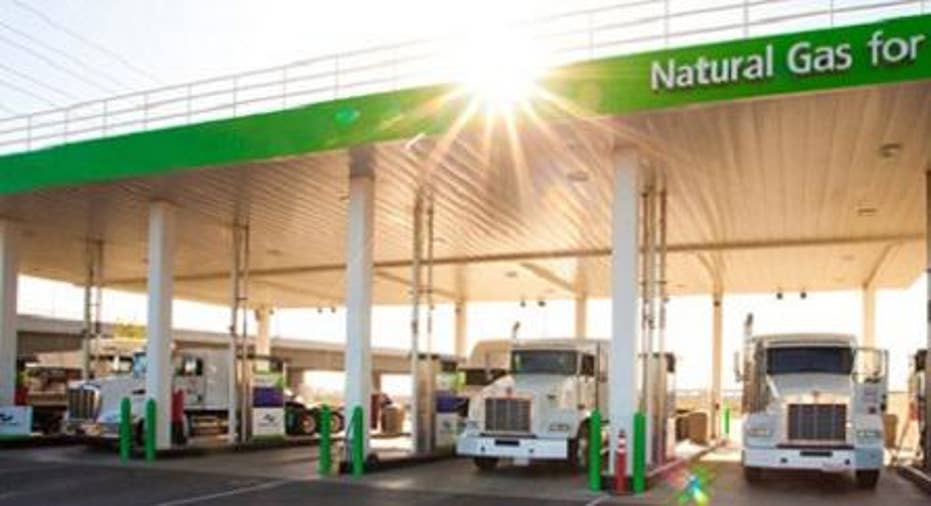Clean Energy Fuels: A Flawed Business Model, or on the Road to Greatness?

Image Source: Clean Energy Fuels corporate website
Alternative-energy investors no doubt follow the pet project of oil-man T. Boone Pickens, Clean Energy Fuels , with some interest. The company has gone all in to engender the use of natural gas (compressed natural gas and liquefied natural gas, specifically) as an alternative to gasoline for garbage and freight trucks, as well as city buses. The inherent advantages are clear: Natural gas is a cleaner fuel and thus less harmful to the environment and was (until recently) drastically cheaper than the crude-oil end product that is gasoline.
Alas, the past 18 months have not been kind to light, sweet crude, and thus any possible alternative fuel as well. While the timing was not ideal (OK, fine, it was awful) for a company like Clean Energy Fuels, an enterprise that took on loads of debt to build natural gas fueling stations for its customers, this appears to be a bump on the road to a natural gas-fueled future. Here's why.
First, the bad newsLet's get the bad news out of the way first. There's plenty to go around.
Clean Energy Fuels has been plagued by losses for years. In fact, the last time it was profitable on a GAAP basis was in 2005. Its performance in 2015 has been no better, with third-quarter results looking like more of the same. Revenue came in at $92.3 million for the three months ended Sept. 30, down 11% from the same period a year ago. GAAP profits -- or should I say losses -- came in at negative-$23.1 million, although the company did boast positive EBITDA results of $3.1 million, a long-held goal for the company in its path to consistent profitability.
Clean Energy Fuels is expected to report results on March 3 for both the fourth quarter and full year. According to analysts polled by S&P Capital IQ, revenues will probably be in the $108 million range, yielding a net loss on a GAAP basis of $8 million ($0.90 per share).
Ten years of losses, even after extremely respectable revenue gains over that time period, seems to lend itself to the idea that this is just a flawed business. However, there is some cause for optimism.
Rays of hopeCurrent difficulties aside, there is cause for hope at HQ. First, there's the simple fact that the company continues to sell more and more fuel (on an absolute basis, not a dollar basis) each and every year. Not only that, but these sales are also being made to what will most likely be very long-term, repeat customers.
The power of this fact cannot be overstated. Natural gas-fueled vehicles are starting to pop up practically everywhere. In North America there are over 3,000 long-distance carrier trucks, 8,000 city buses, and 9,000 waste disposal trucks that all count on Clean Energy Fuels for their fuel each and every day. As noted in an investor presentation on Dec. 22, not only are cities counting on the company for clean, price-competitive fuel, but some of the biggest corporations in the country are jumping aboard the bandwagon as well:
Source: Clean Energy Fuels Corp. investor presentation, Dec. 22, 2015.
We've all have grasped the power of repeat business, having being first exposed to it by glancing in our medicine cabinets and seeing disposable razor blades lying there on the shelf. Just taking a look at Clean Energy's biggest customers inevitably leads to one conclusion: These organizations did the research and were willing to invest the money in natural gas-powered engines for at least a portion of their fleets. They're in it for the long haul, as is Clean Energy Fuels.
The tricky partProjections of profits and big-name customers are all well and good, but this story has been playing out for a decade now. At what point do investors have the right to begin questioning Clean Energy Fuels' viability? Based on the weight of the evidence, and with the full knowledge that we're talking about a decade of red ink, it seems that it's still too early to close the books on Clean Energy as an enterprise. The benefits of natural gas and its bi-products as a fuel for trucks and buses are well documented, and this fact alone lends itself to seeing Clean Energy as a worthy endeavor. Waste Management knew what it was doing when it went down this path for a decent portion of its fleets.The simple fact is that what Clean Energy Fuels is trying to accomplish is both difficult and capital intensive. Customers have no incentive to use natural gas if the station to fuel up at is inconveniently located and uncommon. Would you buy a gasoline-fueled car if there were almost no gas stations along your regular driving route?
Clean Energy has made huge amounts of capital expenditures, and it's finally beginning to see the benefits of years of investment in distribution and the creation of over 550 natural gas fueling stations across the country. AsAndrew J. Littlefair, the company's co-founder and CEO recently put it, in the Q3 2015 earnings call:
Clearly, Clean Energy Fuels has reached an inflection point, and the worst thing believers in a natural gas-fueled future can do is throw in the towel now.
The article Clean Energy Fuels: A Flawed Business Model, or on the Road to Greatness? originally appeared on Fool.com.
Sean O'Reilly has no position in any stocks mentioned. The Motley Fool recommends Clean Energy Fuels. Try any of our Foolish newsletter services free for 30 days. We Fools may not all hold the same opinions, but we all believe that considering a diverse range of insights makes us better investors. The Motley Fool has a disclosure policy.
Copyright 1995 - 2016 The Motley Fool, LLC. All rights reserved. The Motley Fool has a disclosure policy.



















